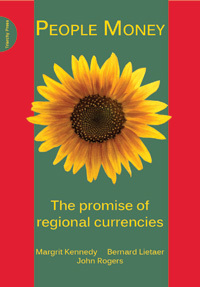Currencies featured include:
Banco Palmas, Brazil
WIR Bank, Switzerland The Business Exchange, Scotland Community Connect Trade, USA RES, Belgium PuntoTRANSacciones, El Salvador Brixton Pound, England Talente Tauschkreis Vorarlberg, Austria Equal Dollars, USA BerkShares, USA Chiemgauer, Germany SOL Violette, France Ithaca HOURS, USA Dane County Time Bank, USA Blaengarw Time Centre, Wales Community Exchange System, S. Africa Buy the book
Paperback offer price £15:
|
People Money - Contents
In Part 1, The Case for Regional Currencies, the authors survey the present monetary system – its history and purpose - and explain its inherent weaknesses. They include a short history of regional currencies and their effects, with many examples. (The oldest one in existence today is the WIR bank in Switzerland, now 78 years old with a turnover of the equivalent of 1.627 billion Swiss Francs in 2010.)
The characteristics and purpose of the various models of commercial- and community-oriented currencies are explained, with examples from rich and poor, urban and rural communities. Different types of currency – voucher systems, circulating currencies, exchange rings and micro-credit banks – are looked at in detail. A regional currency should ideally:
Part 2, Regional Currencies in Practice, focuses on the ‘how to’ of developing a regional currency and the benefits that have accrued as a result of their implementation. Regional currencies can be started by individuals, businesses or local government authorities. Through years of experience and in-depth interviewing of the organisers of different currencies, the authors have developed a framework of 5 phases for new developers to work from. Each of these phases is clearly explained so that, by the end, currency designers will have a:
|
More about the book:
The Authors:
Reviews People Money - main page People Money - Facebook page Related Titles: Money and Sustainability Explore |

